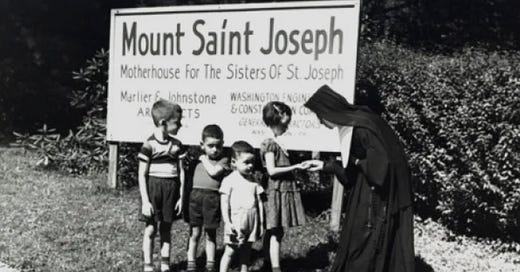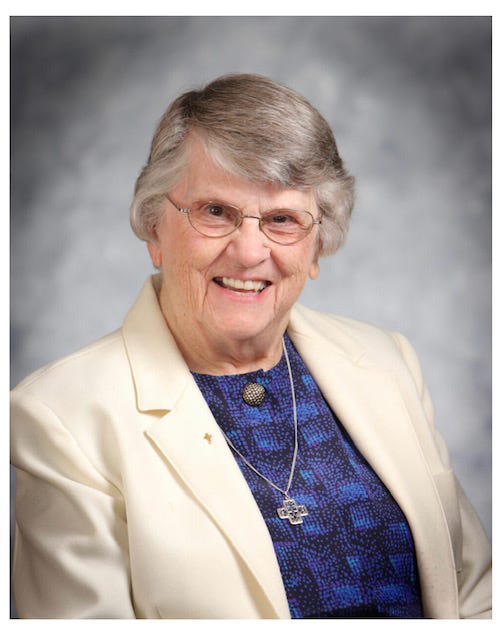The Motherhouse. That's the name of the convent where my Aunt Joan, also known as Sr. Marianne, lives out her retirement as a member of the order of the Sisters of St. Joseph. The Motherhouse sits on a forested hill amid many other forested hills in the panhandle of West Virginia.
Surrounded by rose bushes, big trees, and statues of The Blessed Mary, The Motherhouse serves as both a retirement home and a retreat center for Catholic nuns and laity to come and feel closer to the Divine. The sisters who live there have spent their entire adult lives serving women and children and now rest in the gorgeous environs where they sing and garden and pray for peace on Earth.
Every time I walk into The Motherhouse, I can’t stop crying. My wounded heart feels safe enough to let go there. I don’t break down sobbing, but my eyes are constantly wet and prone to brimming over every time I speak or have a conscious thought.
I’m certain that my emotional state disturbs my aunt, but she’s an old, compassionate woman and has learned to sit with those who mourn without squirming or changing the subject or running away. She doesn’t, however, encourage further and deeper and stronger expression of my grief. So I inevitably reabsorb the tears, suck back the torrent of despair, and pretend I’m done. That’s it. Just a little crying. Not enough to make anyone too nervous or uncomfortable. We can get back to discussing the news or the weather or the garden now. Thank goodness that’s over.
I fantasize about a Motherhouse where I could keep crying for as long as the tears needed to come. A Motherhouse full of women called to facilitate grief. A place where natural grief is supported and honored as an important process that should not be rushed or numbed or suppressed. A place where my 21-year-old self could have gone and received help and encouragement when her mother died of cancer, leaving her lonely and afraid and in so much pain that she truly believed that if she let herself begin to feel her feelings she’d lose herself forever to the tears.
Thirty-two years since my mother died and I still long for a grief midwife. Someone to sit with me and say, “Let go. Surrender to it. Give yourself over to the waves of feeling.” Someone to hold my hand, rub my back, and encourage me to go deeper into my process. Someone to brush my hair back while I wretch from crying so hard while she tells me, “You’re doing great. Keep going. Let yourself feel it. You won’t be given more than you can handle.”
Twenty-four years have passed since my father left his body without warning or fanfare, and I’m still looking for a refuge where I can break down into a liquid mess and surrender to the pain of missing him so much, the fear of living out the rest of my life as an orphan, the terror of dying young myself and leaving my own children with the burden of losing their mother while they are still in the process of finishing childhood themselves.
My fantasy grief midwives would encourage me to drink tea and keep breathing and eventually they would lead me to a pile of pillows on the bed where I could collapse and wail and let the waves of pain wash through me. When I asked them, “How much longer? When will it end?” they would reply, “You’re doing great. Just stay right with it. It takes as long as it takes.”
Apparently, I’ll never be done grieving, although Iusually believe I’m through with the worst of it. Most days, the loss of my parents sits in my heart like a sacred, sensitive coal. I carry the small and constant burning pain with a reverence that keeps me compassionate. My grief connects me to the inevitabilty of loss that accompanies all of us through life. My grief is a gift.
During the periods when my grief feels integrated into my wholeness, I counsel those who have recently lost loved ones that the time will come when the pain doesn’t permeate every day, every moment. Sometime in the future--six months, eighteen months, five years from now--the loss will no longer feel like it just happened. Enough time will pour over the wound and other events and thoughts and feelings will take precedence in your life. Trust me. Your time of acute grieving will end.
I tell people that my grief over the loss of my parents no longer defines me but will always be a part of me. It is a holy thread that I have learned to weave into the tapestry of my life. At each new phase of my development, I must find a way for the aching thread of grief to fit into the new design. I can never leave my grief behind, I tell people, but I’ve learned to appreciate the bittersweet beauty of that sensitive part of myself.
Weaving the thread of grief into my life. It sounds so simple, so like the words of one who has moved past the acute, immediate loss of a loved one. What I don’t readily say is that when the moments come to do the weaving, every few months or years or when I step into my aunt’s convent, I pick up the thread of grief and it feels like a live electrical wire. The pain of loss rushes back into me with a current so strong, I couldn’t let it go if I tried.
And I do try, with sugar or alcohol or political outrage, because I want to get away. Because I want to numb out and escape. Because I don’t have a safe place to go where it’s dark and quiet and smells good and there are women waiting to hold me and make me feel safe and encourage me to feel the pain.
I fully recognize that I am now an adult and it is my responsibility to create for myself safe ways and places to express my grief. But wouldn’t it be wonderful if those places already existed, were institutionalized in our culture and easy to access?
Because when I pick up that live wire of grief, I don’t feel like a responsible, resourceful adult. I’m right back to being that lost and lonely college student, desperate and aching and wishing so hard that someone would notice my pain and lead me to a refuge where my grief would be tended. Where I would be nurtured. Where grief midwives would smooth my tight and worried brow, hold me, and tell me it’s alright to step into the void and feel the pain. Where a group of women called to comfort those who mourn would say, “Let us mother you through the loss of your mother. Let us acknowledge the enormity of your heartache. Let us keep you safe while you pass through the sacred territory of your grief.”
I long for The Motherhouse.
(My Aunt Joan, aka Sister Marianne Carroll, has moved on to the realm of the ancestors since I first wrote this piece. I honor her life of service to women and children.)






Oh reading this made me cry. It's been one year since my mother passed from cancer as well. Phew, it still feels so big. How great the Motherhouse would feel<3
I didn’t know I could love you more. Even imaging this place exists gives me comfort.